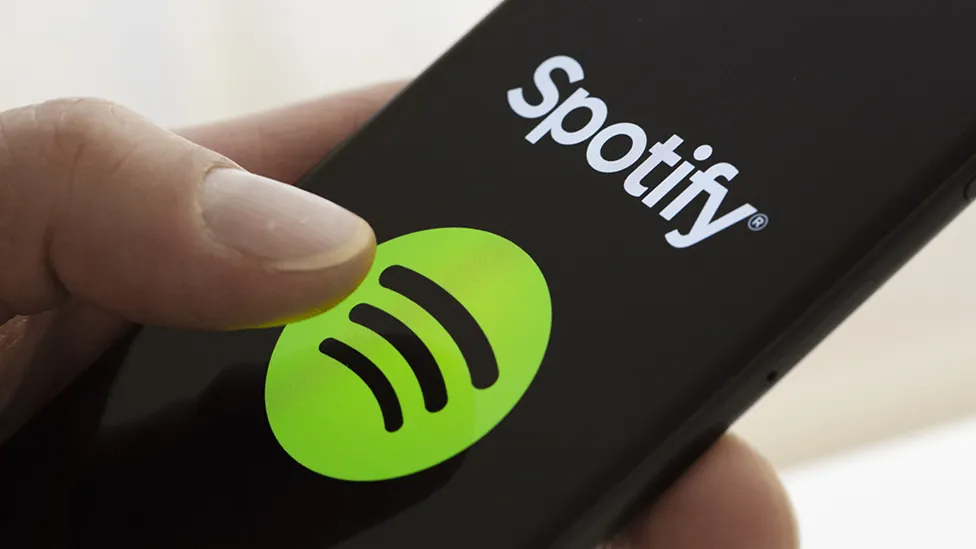
Fans, especially young people who follow artists like Olivia Rodrigo and Eminem, are experiencing clear lyrics despite explicit content being blocked on Spotify.
The platform often displays the song’s original lyrics, which include potentially offensive language such as racial slurs and swear words, even when users opt for the clean ‘radio-friendly’ version.”
The BBC discovered the issue, which affects several popular songs by artists such as Dua Lipa, The Weeknd, Drake, and Lil Nas X.
Spotify declined to comment.
The BBC understands that the company is aware of the issue and is actively working to resolve it.
In 2018, Spotify responded to parental concerns by implementing a system to deal with explicit content. Now, explicit songs are flagged with an ‘E’ to help users identify them easily.
If you prefer not to hear explicit language, you can choose to block explicit content in your settings, and often, clear versions are provided as an alternative.
However, it’s worth noting that in Spotify’s database, many of these edited versions have the same lyrics as the original, exposing users to clear words when viewing the lyrics.

Currently, more than a third of songs in Spotify’s UK Top 50 chart contain explicit lyrics. What’s surprising is that half of those songs have explicit content displayed on screen even when clean. Edit has been selected.In a recent investigation.
The BBC identified an additional 100 prominent tracks affected by the problem, some of which are included in children’s film soundtracks or in playlists suitable for children.
- Dua Lipa – IDGAF
- Olivia Rodrigo – Bad Idea Right?
- The Weeknd – Starboy
- Drake – Nice for What
- Kanye West – Gold Digger
- Eminem (feat Juice Wrld) – Godzilla
- Travis Scott- Goosebumps
- Megan Thee Stallion feat Nicki Minaj & Ty Dolla $ign – Hot Girl Summer
On Wednesday, Spotify appeared to fix the issue of missing lyrics in a few songs after the BBC reported it.
Additionally, it has been revealed that on a desktop or laptop, users can still access clear lyrics even when blocking tracks by clicking on the track names from a search or artist profile page. be given
It’s worth noting that Spotify, boasting over 500 million users, holds the distinction of being the world’s most popular music streaming service.
‘You’re reading every word’
James Roach, known by his muse alias Midlo and contributor to parenting website Music Football Fatherhood, is a father of two. One of them is currently exploring his taste in music.
It’s not something that occurs to you until your child reaches an age where they can really understand and understand words and language,” he says.
“My son is seven, soon to be eight. Lately, it’s become a concern because it could potentially cause a problem. So far, he’s been unable to read or anything.
Not paying much attention to the material. However, now that he’s discovering music he likes and can read well, it’s a different story.
Kids naturally want to emulate their favorite artists and sing along to songs, but the lyrics aren’t always clear.
So, as a parent, you may find yourself going online or using these platforms to understand the actual vocabulary. I think that adds to the challenge because you’re actively looking for it, scrutinizing every word.
Deezer deploys AI to detect clear song lyrics

As a producer, Roach noted that song uploaders on Spotify have the option to submit different lyrics for different versions of their songs.
However, he suspects that some people use the same lyrics. Taking the ‘slow’ approach of clean edits.
Roach expressed his expectation that Spotify would have a strong operation at headquarters but was surprised by the outsourcing revelation.
Spotify, along with other music streaming services, relies on a company called Musixmatch to source lyrics.
Musixmatch claims to be the world’s largest collection of song lyrics, used by millions of people for real-time sync lyrics.Roach raises concerns about this outsourcing and questions whether Spotify has a reliable system in place.
Musixmatch allows fans to contribute, correct or translate lyrics in exchange for ‘kudos’, but the company did not respond to a request for comment.
Unlike movies and some TV streaming services, the music industry does not have an age rating system to highlight potentially inappropriate content.
